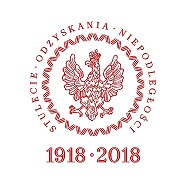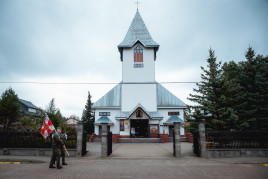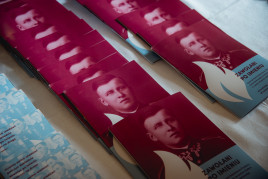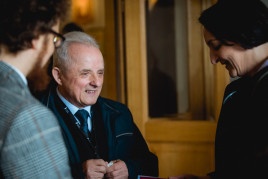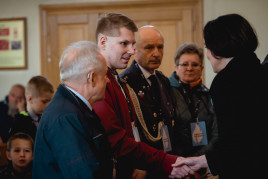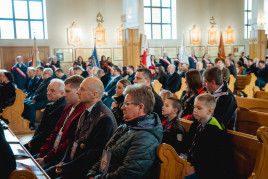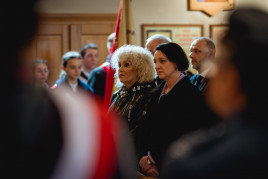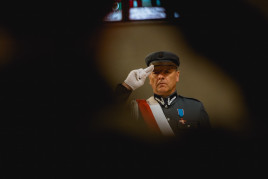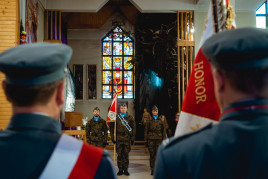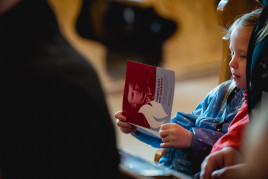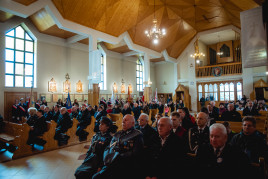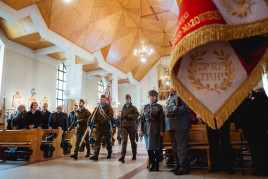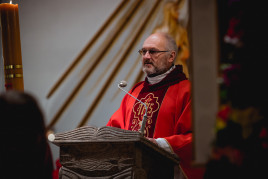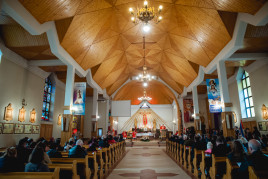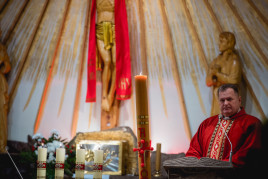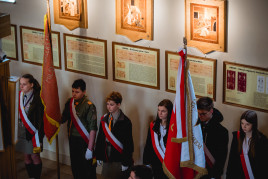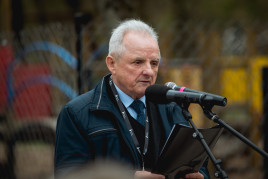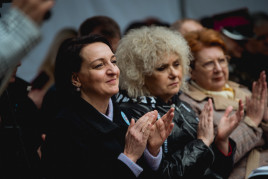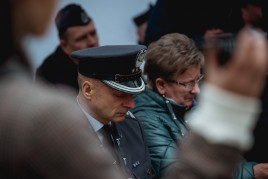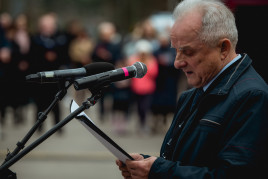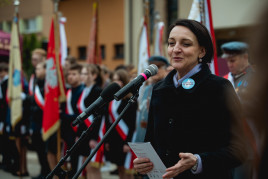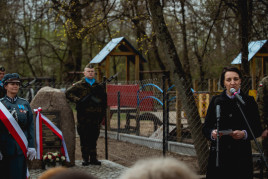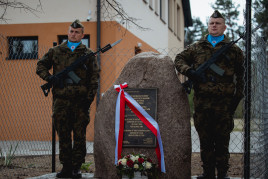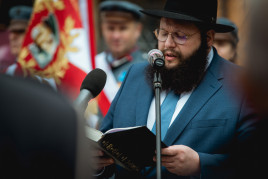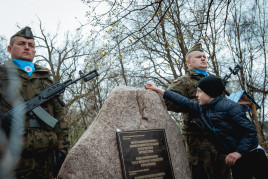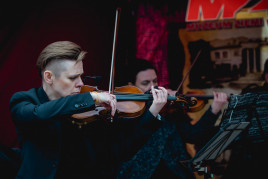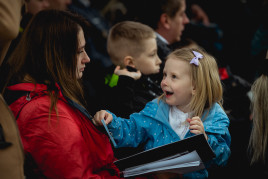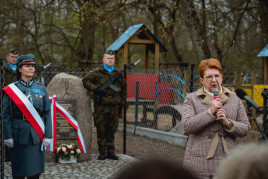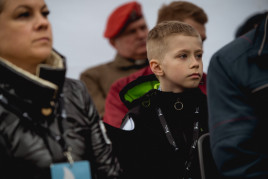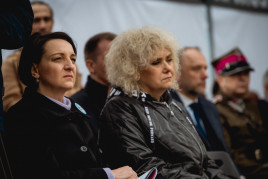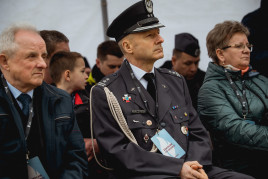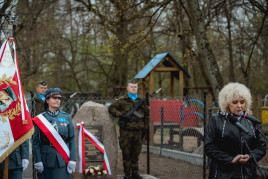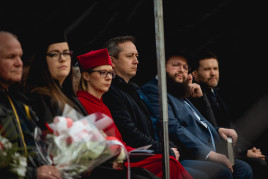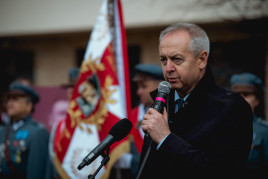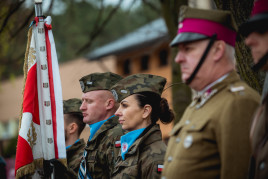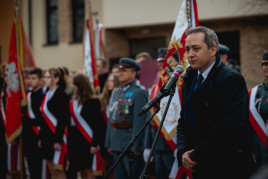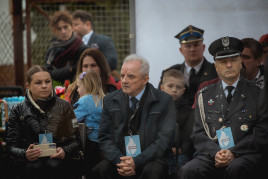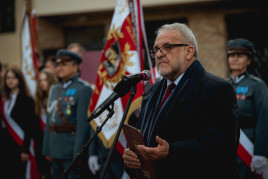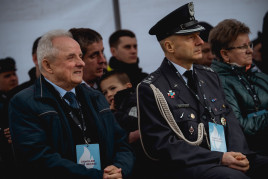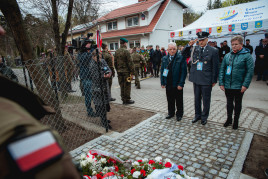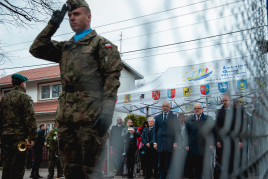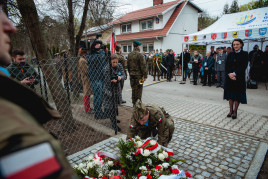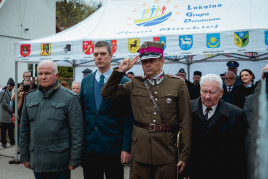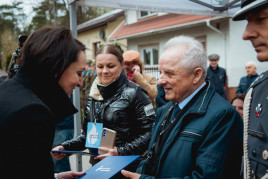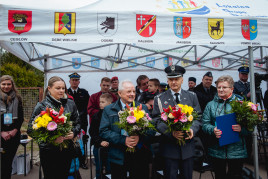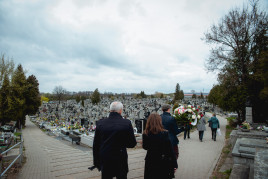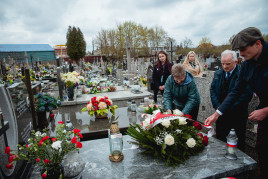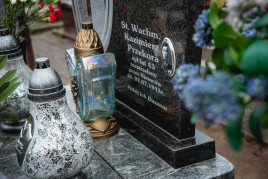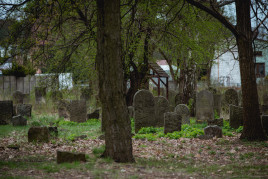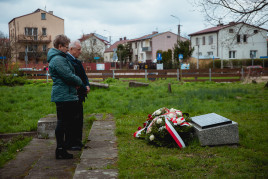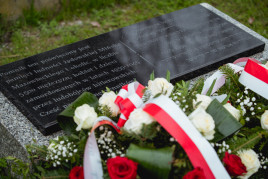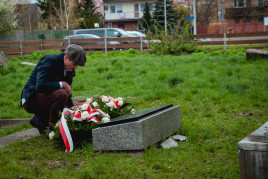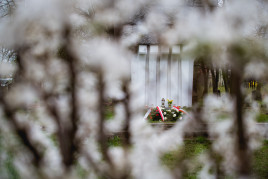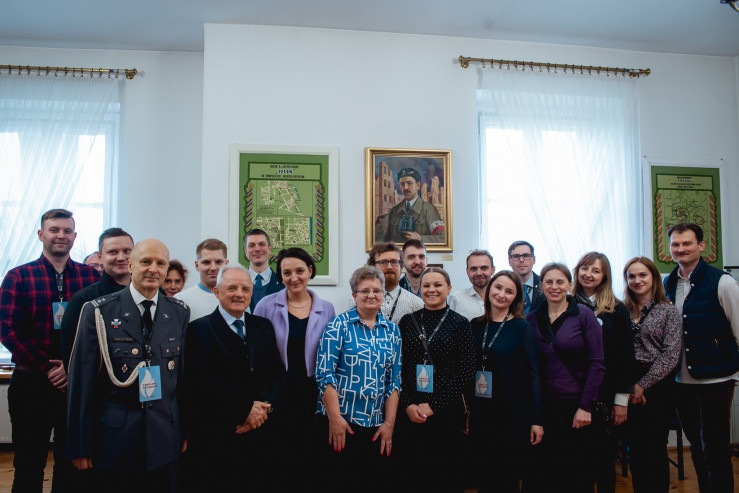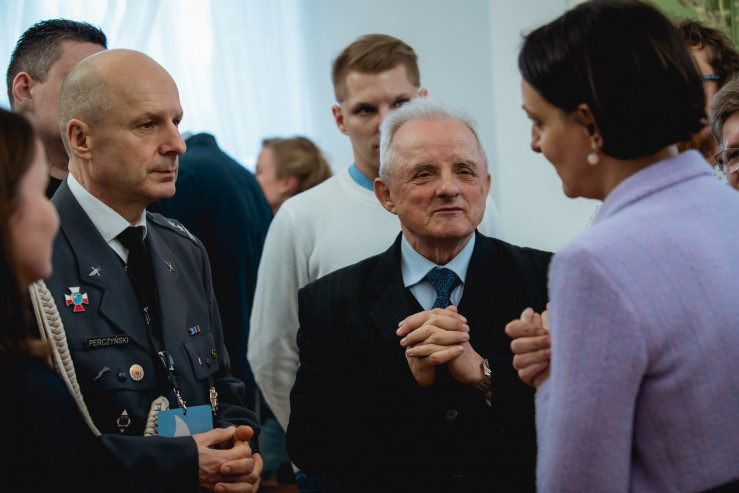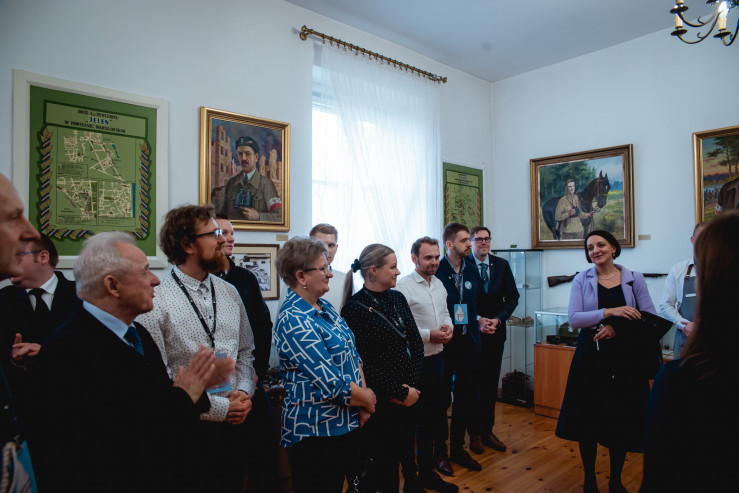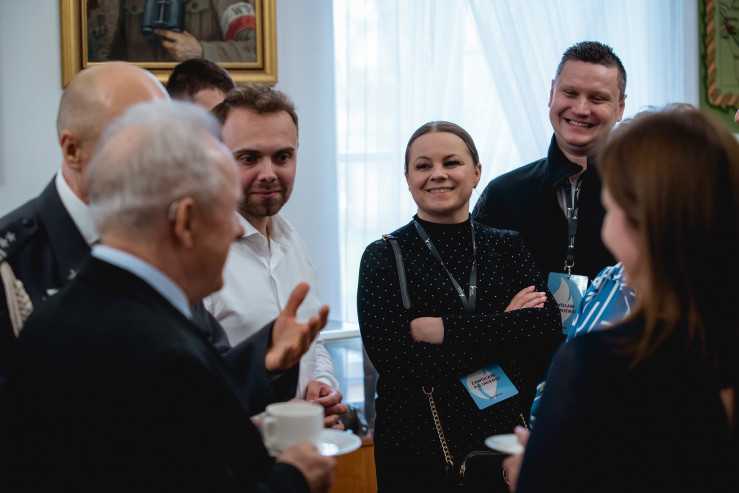The commemoration of Kazimierz Przekora - Instytut Pileckiego
The commemoration of Kazimierz Przekora
On 26 April 2022 in Huta Mińska, during the 26th commemoration as part of the “Called by Name” program, we honored Kazimierz Przekora, who was murdered by the Germans in the summer of 1943 for helping three Jews.
Kazimierz Przekora was born on 14 August 1900 in Włodawa. Most of his youth was spent during the First World War and the struggle for Polish independence. In 1918, he volunteered for the newly-formed 7th Lublin Uhlan Regiment, with whom he fought during the Polish- Soviet War. After the fighting ended, he decided to continue his military career, moving to Mińsk Mazowiecki, where the unit’s garrison was stationed. In 1922, he became a professional non-commissioned officer. During more than 20 years of military service, Kazimierz Przekora became known as a conscientious and dutiful soldier. His commitment was also evidenced by the decorations he received, including the Cross of Valor, the Bronze Cross of Merit and the Bronze Medal for Long Service. When Germany invaded Poland in 1939, Kazimierz Przekora and the second echelon of the 7th Lublin Uhlan Regiment took part in battles in the Lublin region. After the defeat of the defensive war and the dissolution of the unit, he settled in Huta Mińska.
On 15 November 1924, long before the war, Kazimierz Przekora married Helena Miąsek, who lived in Huta Mińska. The couple had two children, Henryk and Wanda,
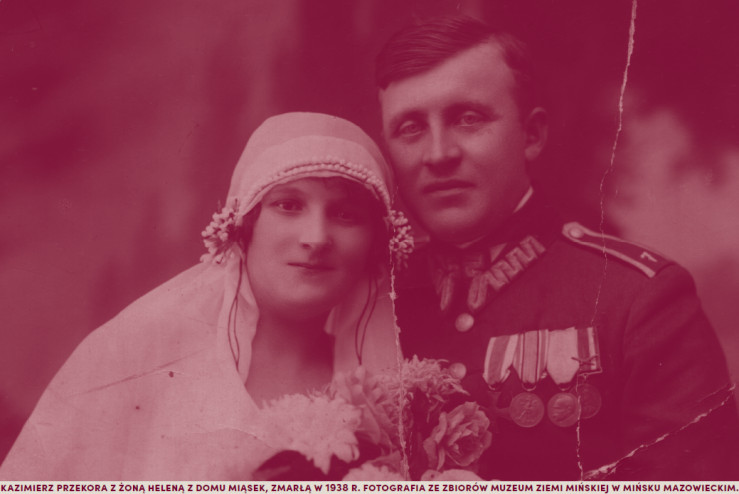
but their joy as a family was cut short by Helena’s untimely death. Przekora remarried in 1940, this time to Władysława Książek.
The German invasion brought long years of bloody occupation. Ubiquitous repression and terror devastated Polish society. The Jewish population faced the greatest persecution. In Mińsk Mazowiecki, about 40% of the population had been Jewish during the interwar period; the Germans established a ghetto there in October 1940, cramming more than five thousand Jews into it. Less than two years later, in August 1942, they began to liquidate the ghetto, sending most of the victims to the Treblinka extermination camp. During the operation, they shot about a thousand people. Those who managed to avoid execution or deportation began a dramatic struggle for survival.
In the summer of 1943, three Jews, probably escapees from a labor camp in Mińsk Mazowiecki, knocked on the door of Kazimierz Przekora’s house, asking for shelter. Despite the death penalty for anyone who gave any kind of help to the Jews, Przekora took them in. He arranged a hiding place in the basement, beneath the kitchen floor. Kazimierz’s daughter, Wanda, saw on many occasions how her father and her stepmother Władysława served food to the hidden Jews.
On 2 July 1943, the Germans, led by the infamously cruel gendarme Friedrich Gutberlet, organized a raid covering the villages of Huta Mińska, Cielechowizna and Gliniak. They also issued an order for all men to report to the schoolyard in Gliniak. Before he left home, Kazimierz Przekora warned the hiding Jews of the danger. His daughter Wanda hid at her aunt’s house nearby.
While local residents were being held at the schoolyard in Gliniak, several German gendarmes searched Kazimierz Przekora’s house and found the hiding place. One of the Jews attempted to escape through the nearby fields, but was immediately shot dead. The gendarmes then shot the other two men on the ground of the local manor.
Meanwhile, at the Gliniak schoolyard, Kazimierz Przekora was accused of hiding Jews. Despite the village leader’s intercession, the gendarmes led him behind the school, toward the fields, where, according to witnesses, he was shot by Gutberlet himself.
This is how Tadeusz Perczyński, the grandson of Kazimierz, remembered these events:
Kazimierz Przekora’s body was buried in the cemetery in Mińsk Mazowiecki. The final resting place of the Jewish men remains unknown to this day. They were probably buried in the fields between Huta Mińska, Cielechowizna and Gliniak. Friedrich Gutberlet survived his victims by more than a year – he died in unknown circumstances at the beginning of 1945.
The Przekora family soon suffered another blow: Henryk, Kazimierz’s son, who fought in the Polish First Army, perished on 18 March 1945 in the bloody skirmishes near Gryfino on the Oder. Wanda, Kazimierz’s daughter, left without immediate family and struggling with deprivation, followed the example of numerous other residents of Mińsk Mazowiecki and the vicinity and moved to the Recovered Territories. She settled in Henryków, where she started a family.
We learned the story of Kazimierz Przekora thanks to Mr. Sebastian Chłopik, a member of the Association for the Remembrance of the General Kazimierz Sosnkowski 7th Lublin Uhlan Regiment. Valuable information was also provided by the family of Kazimierz Przekora. The ceremony began with a mass at the Church of Our Lady of Perpetual Help in Huta Mińska, which was celebrated by Rev. Wojciech Pancewicz; Prelate and Canon, Brigadier General Dr. Sławomir Żarski; Prelate and Canon, Col. Adam Prus; Rev. Lt. Col. Andrzej Bolesław Jackiewicz; and Rev. Adam Praszczałek.
The plaque commemorating Kazimierz Przekora was unveiled jointly by Tadeusz Perczyński and Prof. Magdalena Gawin, Director of the Pilecki Institute and initiator of the “Called by Name” program. A stone with the commemorative plaque is placed in front of the Karol Wojtyła Elementary School in Huta Mińska with its seat in Cielechowizna – which is of special importance to Tadeusz Perczyński, as three of his grandchildren (Kazmierz’s great-great-grandchildren) attend the school.
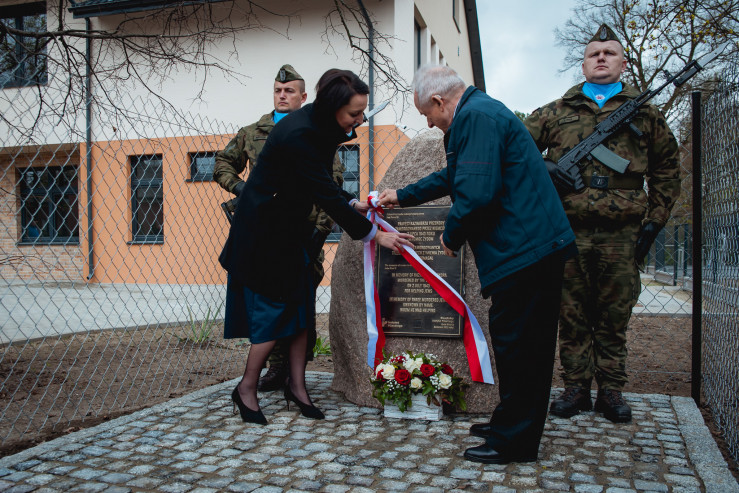
Many years have passed since the death of our grandfather, but we have always remembered and striven to perpetuate his memory. Much credit for this goes to our mom, Wanda Perczyńska. We lived in the Warmia region for many years, but every time we went to my mother’s home area, we visited the grave of her father and our grandfather. As a 14-year-old girl, my mother witnessed the tragedy that unfolded in the summer of 1943 (…). Our whole family is proud of grandfather. He is our role model and inspires us to raise our children, grandchildren and great-grandchildren in the spirit of patriotism and respect for other people - said Tadeusz Perczyński during the ceremony.
Prof. Magdalena Gawin, Director of the Pilecki Institute, recalled the legal situation in Poland under German occupation, and made reference to the war in Ukraine: We now find the idea of punishing people for helping others inconceivable. Today, when Russia has attacked Ukraine, Poles are providing help and shelter, they are opening their homes. Yet how easily such assistance could be crippled by introducing a legal system in which helping others is a crime, while denouncing them is rewarded (…). Death for helping others is unprecedented in the history of Europe. The West never experienced it, and for a long time refused to acknowledge that it happened. This is an extremely important historical context that you have to bear in mind and pass on to further generations.
A representative of the Jewish community, Rabbi Szalom Dow Ber Stambler from the Chabad-Lubavitch movement, observed that today’s ceremony reminds us about all people who provided help to Jews. He also said a prayer for the dead.
The event was organized by the Pilecki Institute, the County Office of Mińsk Mazowiecki, the Commune of Mińsk Mazowiecki and the Museum of the Mińsk Mazowiecki Region. The ceremony was attended by representatives of local associations and organization, the local community, as well as representatives of state authorities, the local government and institutions of learning and culture. Soldiers from the 23rd Tactical Air Base, members of the Association for the Remembrance of the General Kazimierz Sosnkowski 7th Lublin Uhlan Regiment, as well as teachers and students from the Karol Wojtyła Elementary School in Huta Mińska, added splendor to the event.
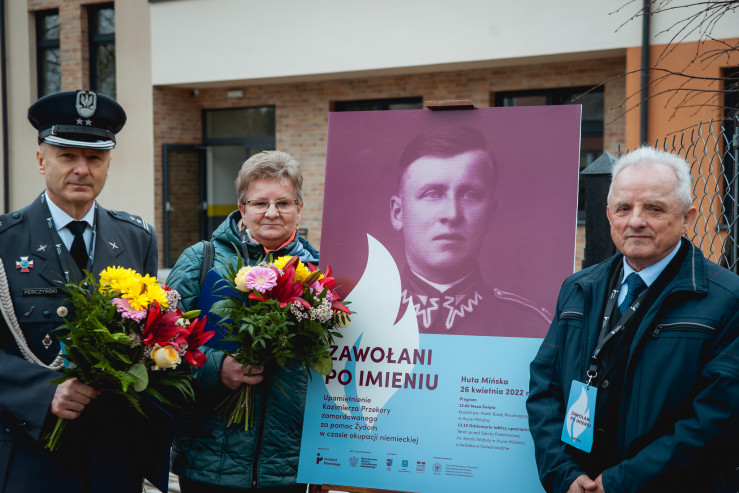
After the ceremony relatives of Kazmierz Przekora and organizers of the event, including employees of the Pilecki Institute, laid flowers on the grave of the commemorated and at the Jewish cemetery in Mińsk Mazowiecki.
Below you can watch a short video report from the event:
National Patronage of the President of the Republic of Poland Andrzej Duda to mark the Centenary of Regaining Independence.
